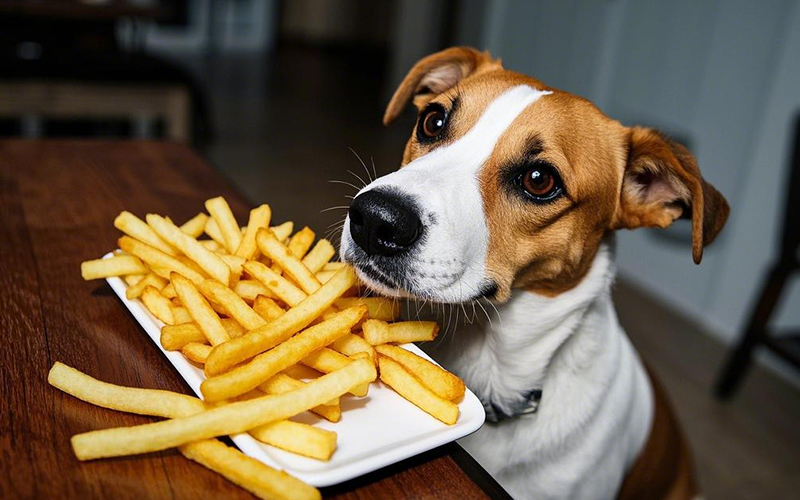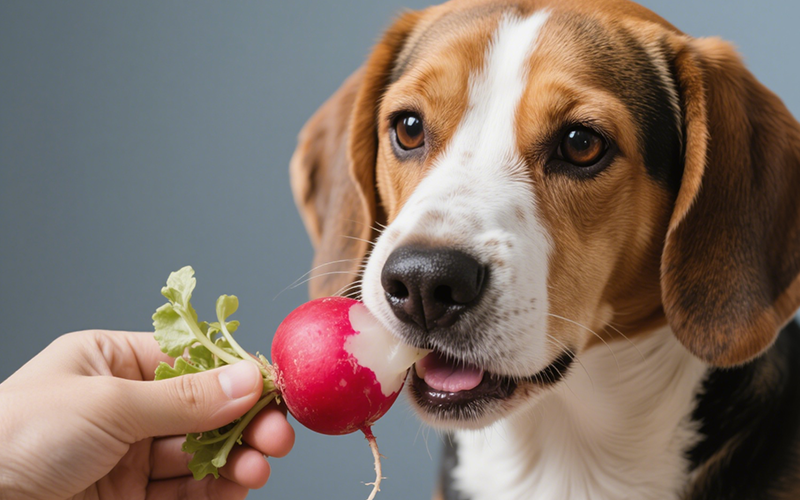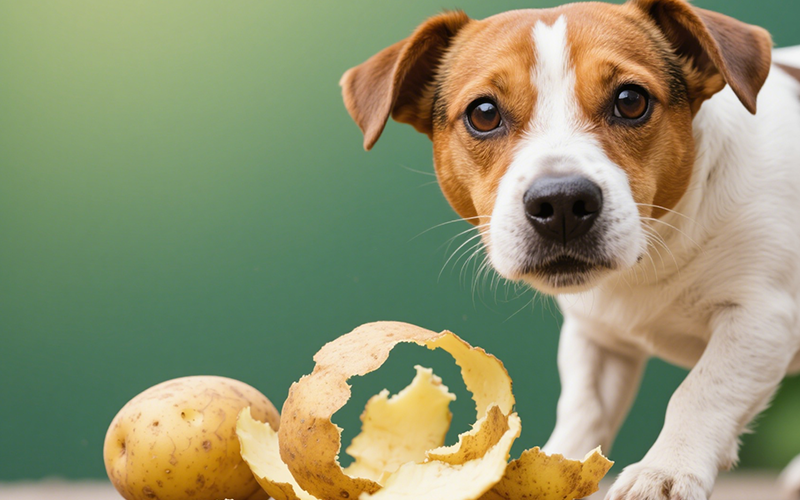Can Dogs Eat Fries? The Risks and Considerations of Feeding Your Dog French Fries
- 13 Mar 2025 11:28
As dog owners, we all want to treat our furry friends to something special now and then. Whether it's a tasty snack or a small bite of what you're eating, it's natural to want to share the joy. However, some foods that are safe for humans can be dangerous for dogs. One common food that often comes up is french fries. If you’ve ever wondered whether it’s safe to feed your dog fries, the answer isn’t straightforward. While dogs can technically eat fries, there are important health risks and concerns to consider.
In this article, we’ll take a closer look at whether dogs can safely eat fries, the potential risks involved, and the best ways to keep your dog healthy when you’re tempted to share your food.

Can Dogs Eat Fries? 🍟
In short, dogs can eat fries, but they should only be given in moderation and with caution. Fries are made from potatoes, which are not toxic to dogs. However, the way fries are prepared and the added ingredients can make them problematic for your pet. Let’s break down the key factors you need to keep in mind.
The Risks of Feeding Fries to Dogs 🚨
While a small piece of plain, unseasoned fry may not harm your dog, there are several risks associated with feeding fries to your pet, especially when they’re prepared commercially or with added seasonings.
High in Fat and Calories 🍔 Fries are often deep-fried in oil, which makes them high in fat and calories. Over time, excessive fat intake can lead to obesity, heart problems, and pancreatitis (inflammation of the pancreas). Obesity in dogs can lead to a range of health issues, including diabetes, joint problems, and a shortened lifespan. It's important to remember that your dog’s dietary needs are different from yours, and they don’t require the high amounts of fat or calories found in fried foods.
Excess Salt 🧂 Another concern with fries is the high salt content. Many fries, especially those from fast food chains or restaurants, are heavily salted. Excessive salt can lead to dehydration, kidney damage, and increased blood pressure in dogs. In severe cases, consuming too much salt can lead to salt toxicity, which can cause symptoms like vomiting, diarrhea, excessive thirst, tremors, and even seizures.
Potential for Seasonings and Additives 🌶️ Fries are often seasoned with additional spices like garlic powder, onion powder, and other flavorings. Garlic and onions are toxic to dogs, even in small amounts, and can cause serious health issues like anemia and damage to red blood cells. Many fries also contain artificial flavorings or preservatives that may not be safe for dogs.
Choking Hazard 🐕 French fries are soft but can be tough for smaller dogs to chew properly. If your dog tries to eat a whole fry at once, it could pose a choking hazard. For smaller dogs or puppies, always break the fries into smaller, bite-sized pieces to avoid any risk of choking.
Symptoms of Overeating Fries in Dogs 🍟
If your dog eats too many fries or eats fries that are heavily salted or seasoned, they may experience symptoms such as:
Vomiting 🤢
Diarrhea 💩
Excessive thirst or urination 💦
Lethargy 😴
Abdominal pain or bloating 😣
Tremors or seizures (in extreme cases of salt toxicity) ⚡
If your dog shows any of these symptoms after eating fries, it's important to monitor them closely and consult your vet if necessary.
Safe Ways to Share Fries with Your Dog 🍟
If you decide to share a fry with your dog, follow these safety tips to minimize any health risks:
Limit Portion Size ⚖️ Only give your dog a very small amount of fry. A tiny piece of a single fry is enough to satisfy your dog’s curiosity without overloading them with calories, fat, or salt. Treat fries as an occasional snack, not a regular part of their diet.
Choose Plain, Unseasoned Fries 🚫 Always offer plain, unsalted fries with no added seasonings like garlic, onion, or artificial flavorings. Avoid fries from fast food chains, as they often contain high levels of salt and other harmful additives. Ideally, prepare your own fries at home using minimal salt and no seasonings, or offer baked fries instead of deep-fried ones.
Cut Into Small Pieces ✂️ To reduce the risk of choking, make sure to cut the fries into smaller, more manageable pieces. This is especially important for small dogs or those that tend to gulp their food.
Avoid Frequently Feeding Fries 🍽️ French fries should be considered a rare treat, not a regular part of your dog’s diet. They provide little nutritional value to your dog and can contribute to long-term health issues if given too often.
Healthy Alternatives to Fries for Dogs 🥕🍏
If you want to treat your dog without the health risks associated with fries, consider these healthier alternatives:
Carrot sticks 🥕: Low in calories, high in fiber, and great for your dog’s teeth.
Apple slices 🍏: A sweet, crunchy treat that provides fiber and vitamins.
Sweet potatoes 🍠: Rich in fiber, vitamins, and antioxidants. You can bake or steam them for a healthy snack.
Green beans 🥦: Low-calorie and full of nutrients, making them a great snack for your dog.
Pumpkin 🎃: Packed with fiber and good for digestion, pumpkin is a safe and nutritious treat.
These alternatives provide more nutritional benefits than fries and are safer options for your dog’s overall health.
PettureX: Your Pet’s Health Assistant 🐾💻
If you're ever unsure about what foods are safe for your dog, or if you notice your dog has eaten something that could be harmful, PettureX is a great resource. PettureX is an AI-powered pet health assistant that offers 24/7 online consultations and advanced image recognition. Whether you need advice on a specific food or want to know more about how to keep your dog healthy, PettureX can offer helpful and reliable guidance.
Conclusion: Can Dogs Eat Fries? 🍟
To sum it up, while dogs can technically eat fries, they should only be given in moderation and with caution. Fries are high in fat, salt, and calories, and they offer little nutritional value for your dog. The best approach is to treat fries as an occasional snack and stick to healthier alternatives like carrots, apples, or sweet potatoes for regular treats.
Always remember that your dog’s diet should be based on nutritious, dog-friendly foods that support their long-term health. If you’re ever in doubt about a food or treat, reach out to your vet or use a tool like PettureX to get personalized advice.
Related

Radish Bites for Your Buddy? A Vet-Reviewed Guide on Whether Dogs Can Eat Radishes
- 22 Apr 2025
Potato Peels for Pooches? Unpeeling the Risks and Facts for Dog Owners
- 22 Apr 2025
Crunchy Curiosity: Can Dogs Safely Snack on Pork Rinds? A Deep Dive
- 21 Apr 2025
Pomegranate Seeds and Pooches: A Deep Dive into Whether Dogs Can Safely Indulge
- 21 Apr 2025
Can Dogs Eat Peaches? Vet Explains Benefits, Cyanide Risks & Safe Serving
- 16 Apr 2025
Can Dogs Eat Mulberries? Vet Explains Safety, Benefits & Potential Risks
- 16 Apr 2025
Can Dogs Eat Mozzarella? Vet Explains the Cheesy Truth (Risks & Benefits)
- 16 Apr 2025
Can Dogs Eat Maple Syrup? The Sugary Truth & Why Vets Advise Against It
- 16 Apr 2025
Can Dogs Eat Mango Skin? Vet Explains Why It's a Risky Chew!
- 16 Apr 2025
Can Dogs Eat Mac n Cheese? Vet Explains Why This Comfort Food Is Unsafe!
- 16 Apr 2025
